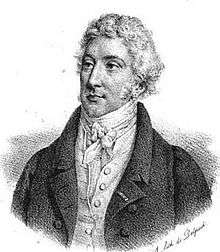Alexandre-Théodore-Victor, comte de Lameth
| Alexandre-Théodore-Victor Lameth | |
|---|---|
 | |
| Born |
20 October 1760 Paris, France |
| Died | 18 March 1829 |
| Title | Count |
| Relatives |
Charles Malo François Lameth (brother) Théodore de Lameth (brother) |
Alexandre-Théodore-Victor, comte de Lameth (20 October 1760 – 18 March 1829) was a French soldier and politician.
- Bulleted list item
Life
He was born in Paris to Louise Charles de Lameth and Marie Thérèse de Broglie.[1] His mother was the sister of the Marshall de Broglie and a favourite of Marie Antoinette.[2] Having served in the American War of Independence as a colonel in the Royal Lorraine Regiment under Rochambeau,[3] He was a Knight of the Order of Malta.[4]
He was sent in 1789 as deputy to the States-General by the nobles of the bailliage of Péronne, Somme. In the Constituent Assembly he formed with Barnave and Adrien Duport a "Triumvirate," which controlled a group of about forty deputies forming the advanced left of the Assembly. He presented a famous report in the Constituent Assembly on the organization of the army, but is better known by his eloquent speech on 28 February 1791, at the Jacobin Club, against Honoré Mirabeau, whose relations with the court were beginning to be suspected, and who was a personal enemy of Lameth. However, after the flight of Louis XVI to Varennes, Lameth became reconciled with the court. With Barnave and Duport he became a leader of the Feuillant faction, supporting the Constitution of 1791 and the continuation of the monarchy. He served in the army as maréchal-de-camp under Nicolas Luckner and the Marquis de la Fayette, but was accused of treason on 15 August 1792, fled the country, and was imprisoned by the Austrians.[5]
After his release he went into business at Hamburg with his brother Charles and the duc d'Aiguillon, and did not return to France until the Consulate. Under the Empire he was made prefect successively in several departments, and in 1810 was created a Baron of the Empire.[6] In 1814 he attached himself to the Bourbons, and under the Restoration was appointed prefect of Somme, deputy for Seine-Inférieure and finally deputy for Seine-et-Oise,[7] in which capacity he was a leader of the Liberal opposition. He was the author of an important History of the Constituent Assembly (Paris, 2 vols., 1828–1829).[5]
He had two brothers, Théodore Lameth (1756–1854) who served in the American war, sat in the Legislative Assembly as deputy from the department of Jura, and became maréchal-de-camp; and Charles Malo François Lameth.[5]
See also
- FA Aulard, Les Orateurs de l'Assemblée Constituante (Paris, 1905)
- Jean Maurice Tourneux, Bibliog. de l'histoire de Paris (vol. iv., 1906, s.v. "Lameth").
References
- ↑ , GeneaNet
- ↑ Chronicle of the French Revolution, Longman 1989 p.35
- ↑ Chronicle of the French Revolution, Longman 1989 p.35
- ↑ Chronicle of the French Revolution, Longman 1989 p.36
- 1 2 3 Chisholm 1911.
- ↑ Chronicle of the French Revolution, Longman 1989 p.668
- ↑ Chronicle of the French Revolution, Longman 1989 p.668
- Attribution
 This article incorporates text from a publication now in the public domain: Chisholm, Hugh, ed. (1911). "Lameth, Alexandre Théodore Victor, Comte de". Encyclopædia Britannica. 16 (11th ed.). Cambridge University Press.
This article incorporates text from a publication now in the public domain: Chisholm, Hugh, ed. (1911). "Lameth, Alexandre Théodore Victor, Comte de". Encyclopædia Britannica. 16 (11th ed.). Cambridge University Press.